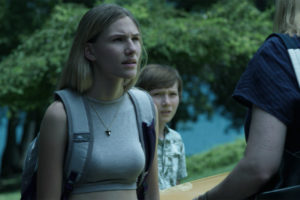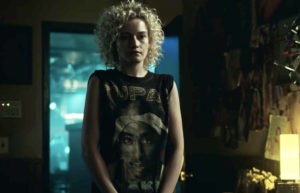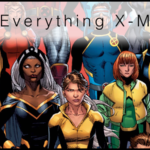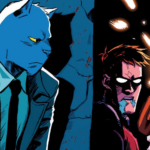
As with much else in my life, I often come to entertainment years, if not decades, after its initially released. I just watched The Godfather for the first time and, less embarrassingly, I finally binged my way through Breaking Bad at the start of 2021. I was in the middle of the last season when I brought it up with my tattoo artist in February. We spent the entire two-hour session discussing the philosophical underpinnings of the show, and I’ve found that it’s like that with most people when the show comes up in conversation. There’s a reason that it has been likened to ancient Greek drama; the catharsis is there, and, as Rich Bellis observes, “If Breaking Bad shares anything with Sophocles’s play, it’s the illusion of control.”
And I posture that it’s this “illusion of control,” among many other elements, that puts Breaking Bad in a different league than Netflix’s Ozark–which feels so controlled to the point that I envision the show unfolding in the Hunger Games arena. Recently, it was announced that Ozark would return for a fourth and final season, though the release date has not yet been verified. Spinning out of Breaking Bad, I was desperate for another substantive show that would help fill the void. Ozark had been previously recommended to me, and after reading the description, it seemed like a wise successor to my beloved Breaking Bad: it’s about a white, middle class suburban family who ends up conducting illegal activity in order to pay the bills.
The similarities have been regularly addressed by critics, some even daring to argue that (*gasp*) Ozark is superior to Breaking Bad. This article does not seek to make a case in this vein (though, by the end, it will be obvious which show has my loyalty). Instead, what I aim to argue is that, if Breaking Bad is a Sophocles-esque play, then Ozark is a Medieval morality play — genres that have very different functions and subsequently very different artistic designs. Accordingly, it’s not only unfair but also unproductive to compare them.
Morality plays, popularized in 15th- and 16th-century Europe, are a type of allegorical theatrical entertainment. The characters are merely personifications of abstract qualities of good and evil (e.g. Beauty, Greed, etc.). The protagonist (generally) embodies Humanity and, through their encounters with these various abstractions, either chooses the right or the wrong path. The goal of morality plays, therefore, is to teach moral lessons. While Ozark doesn’t neatly fit this pattern, of course, there are enough resemblances that, once I came to this realization in the first season, I wasn’t able to watch the subsequent two seasons without that lens.

This article’s focus will be on some of the central characters as that’s really what distinguishes Ozark as a modern morality play. Marty Byrde (Jason Bateman) personifies apathy. He is not driven by desperation or power or revenge like Walter White (Bryan Cranston) of Breaking Bad. He simply exists, going with the flow, even if it puts him in serious danger. At least characterize him as depressed or disturbed in some capacity! Instead, he’s just there. Despite all his talk of “mitigating risk,” he doesn’t seem to actually care that much — even about his own family. In fact, none of the family members really seem to love each other at all; their bond is loose at best. Furthermore, his soft, monotone voice adds to this as viewers just wait for him to whisper off quietly into the woods. It would take me more than one episode to notice his absence.

Marty’s wife, Wendy Byrde (Laura Linney), is a replica of Skylar White (Anna Gunn), but whereas Skylar has a distinct personality and a complicated psyche, Wendy just embodies narcissism. The first three seasons have hopelessly tried to give her an interesting backstory, with a nod here or there to her stint with depression or her sociopathic tendencies, but it all comes across as half-hearted. She has no moral code whatsoever and simply acts for her own benefit — not caring who is hurt in the process. And, while Marty might get upset sometimes, he just quietly deals with it, attempting to fix the problem as best he can. Moreover, when Wendy’s long-haired bipolar brother Ben Davis (Tom Pelphrey) shows up in Season 3, it’s obvious that he’s meant to serve as a foil to Marty in order to feed Wendy’s growing ego.

Their children, Charlotte (Sofia Hublitz) and Jonah (Sklyar Gaertner), are merely outlines, caricatures. Charlotte’s “I want to be emancipated” stunt comes across like an entitled child whining until they get their way, and Jonah is the loner, super smart, weird kid who needs help but isn’t quite a sociopath or a psychopath. It’s all just messy and vague.
Moving outside of the Byrde family themselves, it’s worth addressing, as well, how the existing townsfolk of the Lake of the Ozarks (those who resided there long before the Byrdes came to town to launder money) also personify certain abstractions and fail to fully materialize as characters. There is the obviously sociopathic elderly couple Darlene Snell (Lisa Emery) and Jacob Snell (Peter Mullan) who are just comically evil. It’s actually uncomfortable how one-dimensional they are, almost as if you are watching a spoof. This is begging to be a morality play.

And then there’s the other key family, the Langmores. I am not going to get into all of the characters, but I do want to highlight two. Wyatt Langmore (Charlie Tahan), a sometimes friend of Charlotte’s, embodies disillusionment. It is not his rural up-bringing that belies this. It’s quite the opposite: he is shown to be well-read, intelligent, and the one in the family who can actually get into college. But he is certain that his family is cursed, and he comes to believe that not even college is a viable solution. There is no solution to his despair.

In stark contrast to each of the characters described here, there is Ruth Langmore (Julia Garner) — the only complex character, and to be honest, the only reason I actually watched three seasons of Ozark. No one would willingly watch three seasons of morality plays; there is a reason they were known as interludes. I returned to Ozark simply to learn more about Ruth, the one character who is difficult to classify. She is incredibly smart and intuitive despite lacking a formal education, and one never knows exactly how she will respond to a situation. Her hard exterior is undercut regularly by a deep love for those around her, and it’s impossible not to admire her determination. Without Ruth, however, all the conversations among the characters feel scripted and pithy — exactly what one would imagine from a morality play.
There are other aspects of the show as well that grow tired — the scenery, the predictability of the events that transpire, the iconography — but it is the lack of any real character development or complexity that prevents this show from being anything more than Medieval entertainment. It is truly an interlude: something that I can watch while knitting or planning a grocery list, and, while some may deem that a selling point, it isn’t to me. I want a show to command my attention, like Breaking Bad.
I suppose I’ve come to the conclusion that, as a morality play, it has some merit, but ultimately the format prevents it from being a success, and not even Ruth can carry what should be an interlude across four seasons. Will I watch Season 4 when it airs? It’s likely. I’ve made it this far, and I do sincerely find Ruth’s character intriguing. It’s just a shame that the rest of Ozark is weighed down by the trappings of a morality play. And yet, here I am, still wondering what the moral actually is. The threat of death and danger is constantly present, but the stakes never feel high. At no point have I been concerned that it wasn’t going to be okay for the Byrds and even the Langmores, for the most part. Perhaps, the long-awaited moral is what will be delivered in the final season. And, as the bribed pseudo-therapist declares, “I suppose I want to see where [the] story ends.”

![[REVIEW] THE LAST ANNIHILATION: WICCAN AND HULKING #1](https://geekd-out.com/wp-content/uploads/2021/08/last-annihilation-wiccan-hulkling-feat-150x150.jpeg)

